Aladdin Pt 1: The 'street rat' and the princess with an edge
 Monday, May 20, 2019 at 6:00PM
Monday, May 20, 2019 at 6:00PM 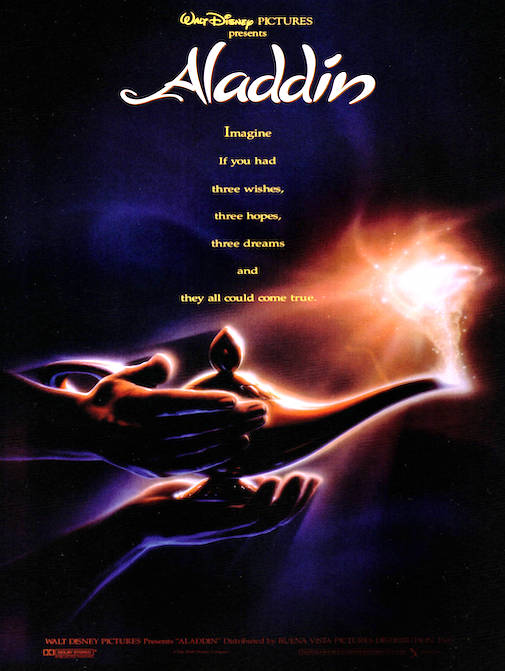
Three-Part Mini-Series
Occasionally we'll take a movie and baton pass it around the team and really dive in. If you missed past installments we've gone long and deep on Rebecca, Silence of the Lambs, Thelma & Louise, Who's Afraid of Virginia Woolf, A League of Their Own, and Rosemary's Baby in the past. -Editor
Part 1 by Ben Miller
Welcome to Team Film Experience's Aladdin Retrospective. This film was a big part of my childhood and I’m proud to join in on the fun to revisit it with you before the live-action remake hits. Disney in the 1990s might have been the animated studio's peak. They were coming off the surprise success of The Little Mermaid in 1989 follwed by the monster hit and then-historic Best Picture nominee of Beauty and the Beast in 1991. The massive success of Aladdin the very next year felt like a commercial/critical apex (at least until The Lion King arrived two years later).
0:00:26 – Alan Menken probably does not get enough credit for the score he put together. Yes, he won an Oscar for it, but it doesn’t get put into the conversation enough for GREAT animated scores.
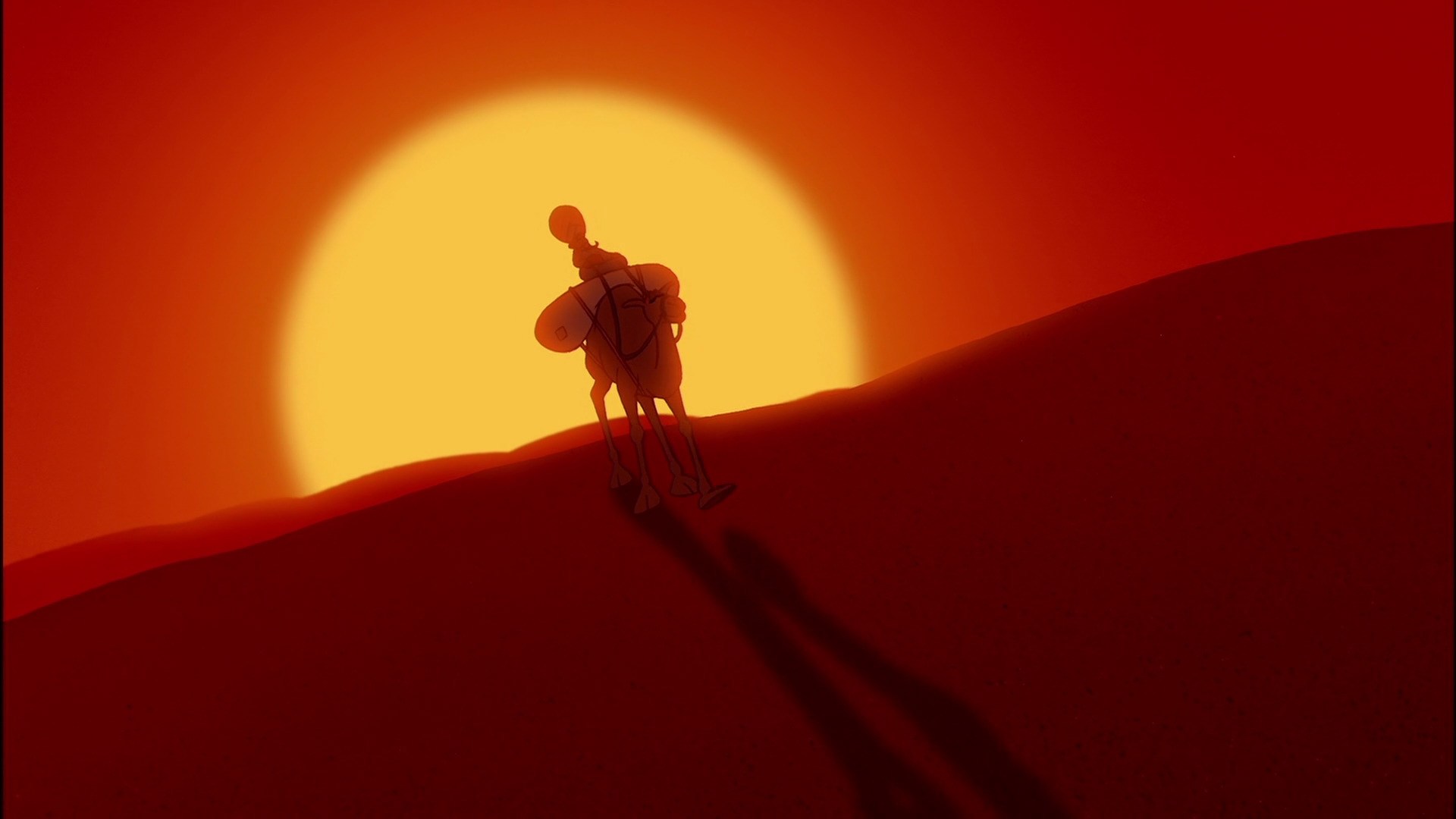
0:00:44 – You get some serious Lawrence of Arabia vibes in the opening, and if you ever get compared to that, you are in a good place.
Oh I come from a land, from a faraway placeWhere the caravan camels roamWhere they cut off your earIf they don't like your faceIt's barbaric, but hey, it's home
0:00:55 – There are two clear MVPs of this film. First and foremost is Robin Williams, but the songwriting teams of Howard Ashman/Menken and Menken/Tim Rice are close runners up. As the opening credits roll, you hear the memorable “Arabian Nights”
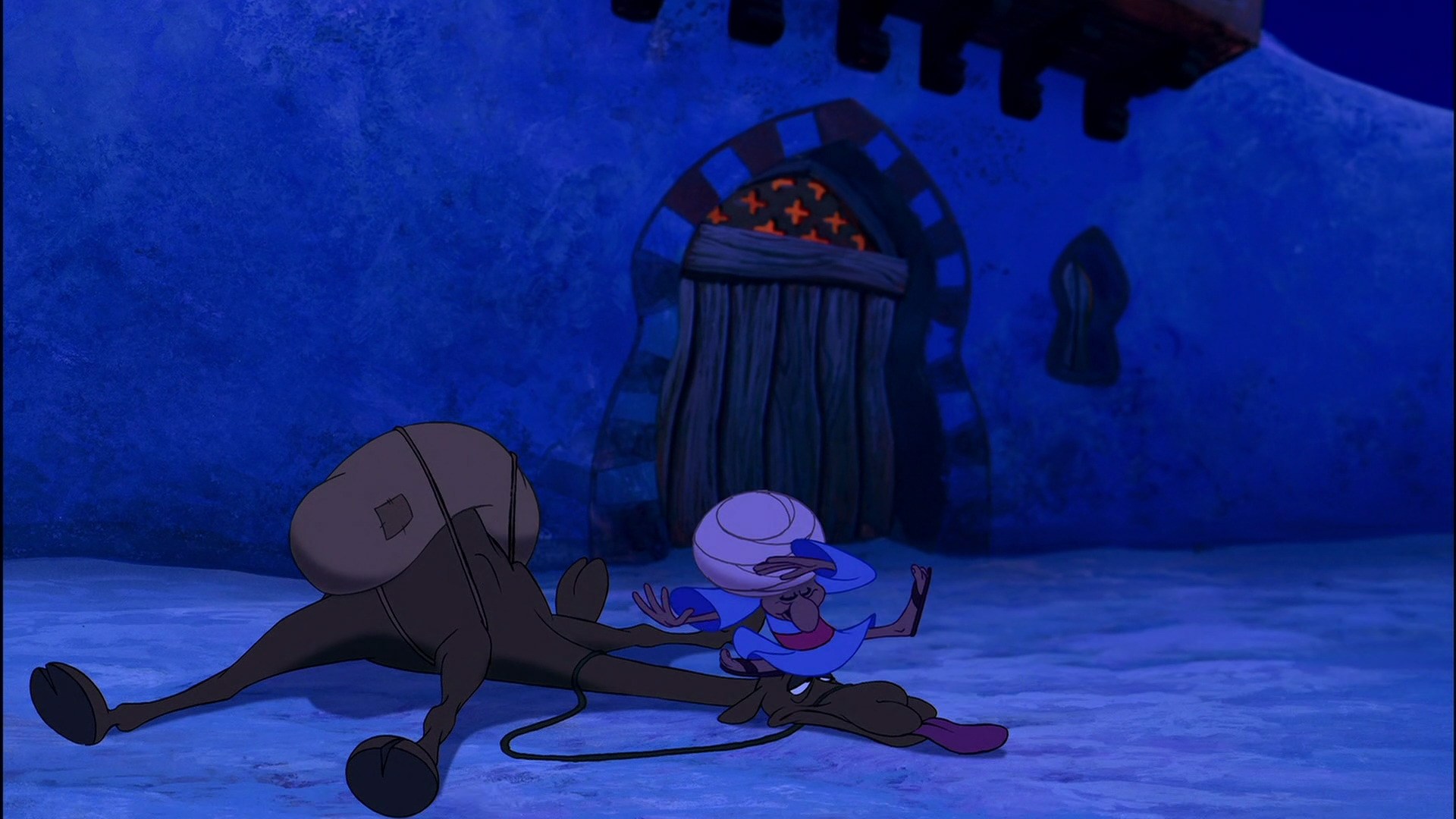
0:01:02 – And we arrive in Agrabah, which seems almost like a character itself. The production design on the palace is another supremely memorable facet of this film. We get a fly through of the city and end up with the shopkeeper sliding off a tired camel
0:01:41 – The shopkeeper breaks the fourth wall and gets “too close” for comfort. This character is also voiced by Robin Williams. Just as we will discuss with the Genie, the shopkeeper is a showcase for his manic energy. You can tell from his delivery that the filmmakers told Williams to act like a shopkeeper and the animators adapted to his style. Only Williams could come up with a hookah that also makes julienne fries.
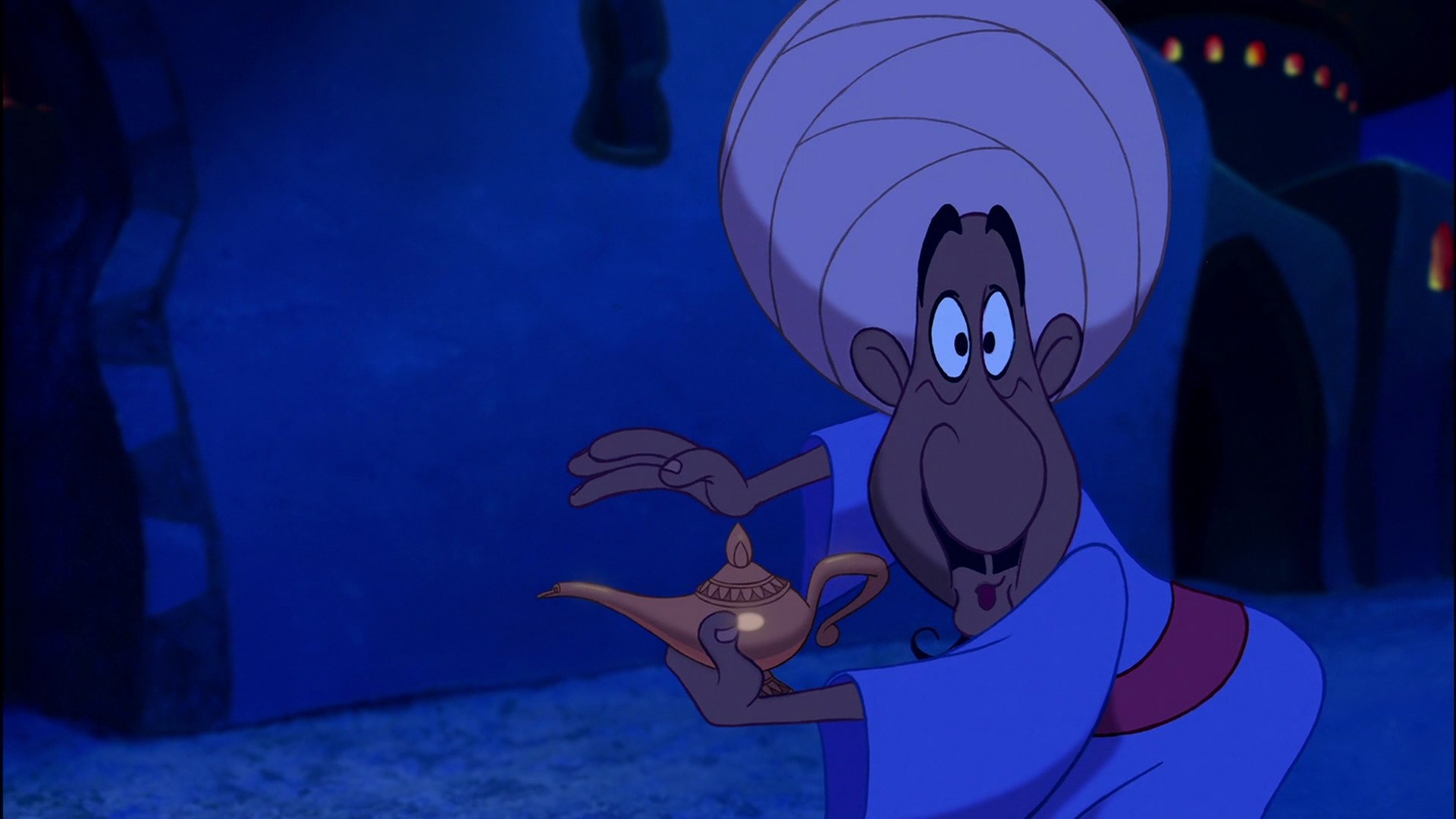
0:02:28 – We are introduced to the lamp, which simplicity of design is one of the more brilliant decisions in the film. Despite the lack of opulence, the design itself includes a pouring spout, a matching base and top design, plus an unconnected handle and flame top
0:02:56 – The shopkeeper throws up some stars into the sky and the official timeline of the film begins
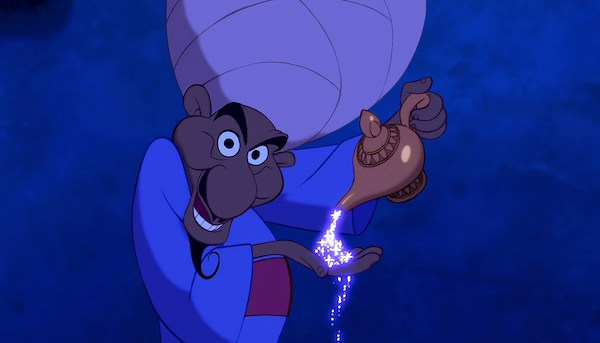
“On a dark night, where a dark man waits, with a dark purpose…”
0:03:10 – “You are late…” hisses Jafar. We are introduced to the royal nazzir with his trusty parrot Iago perched on his pointed and caped shoulders. Jafar appears to be about 6’9”, but only couldn't weigh over 150 pounds. His appearance is simultaneously imposing and lithe, two sides of a spectrum you don’t expect to interact. Previous Disney villians like Ursula or Gaston are seen as these forces of nature who bend others to their will. Jafar presents a different force, but one that feels wholly unnatural and unsettling.
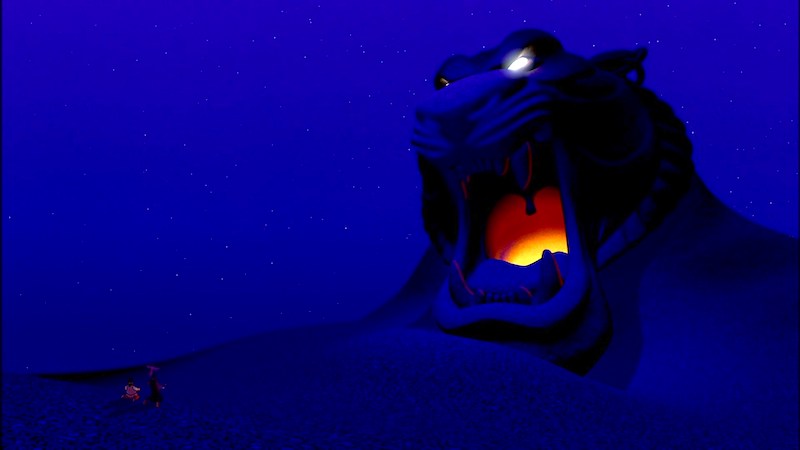
0:03:35 – A stolen trinket leads a mad dash across the desert and out emerges the Cave of Wonders in the form of a computer-generated tiger mouth. CGI/handdrawn animation collaboration was in its infancy at this point, but the entire sequence holds up very well. Gazim the thief attempts to enter the cave, but he is eaten by the cave for not being the “diamond in the rough”
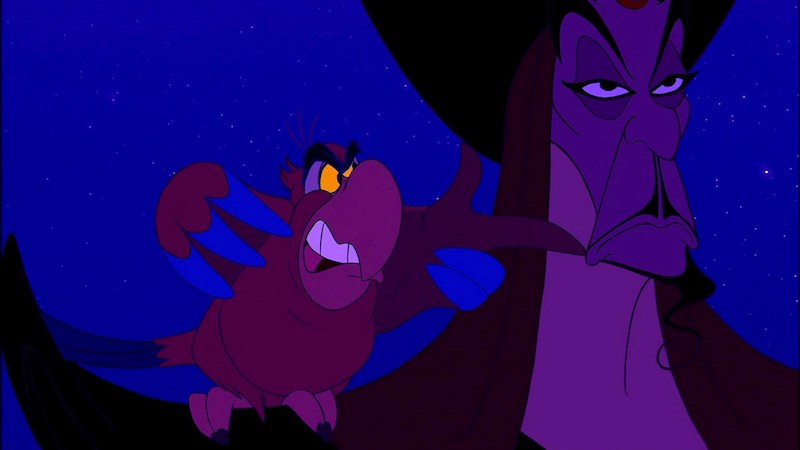
0:05:46 – We get the first real show of Iago and the voice casting of Gilbert Gottfried. Disney has a long history of hiring vulgar comedians for roles in kid films (see Sarah Silverman as a current example) and it always seems to work. While Johnathan Freeman voices Jafar with smooth mysticism and controlled tambour, Gottfried is harsh and abrasive, with no whisper or subtlety. It’s a perfect break in the action to get a little comic relief.
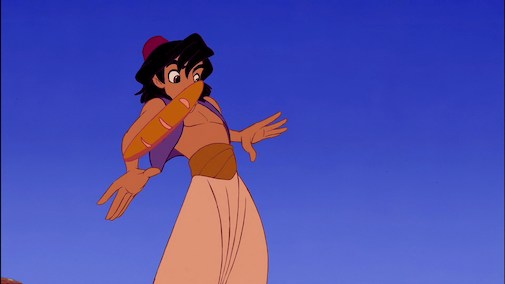
0:06:30 – We are introduced to our title character running from guards on the rooftops with a loaf of bread. Aladdin dresses like no human ever would, but this is animation, so it gets a pass. The original concept of Aladdin was more childlike, but they decided to buff him up to appeal more to women. They used 90s-era Tom Cruise as an example, and it shows
0:07:15 – Disney’s history of non-verbal but expressively intelligent animals stays strong with Abu, Aladdin’s trusty monkey best friend.
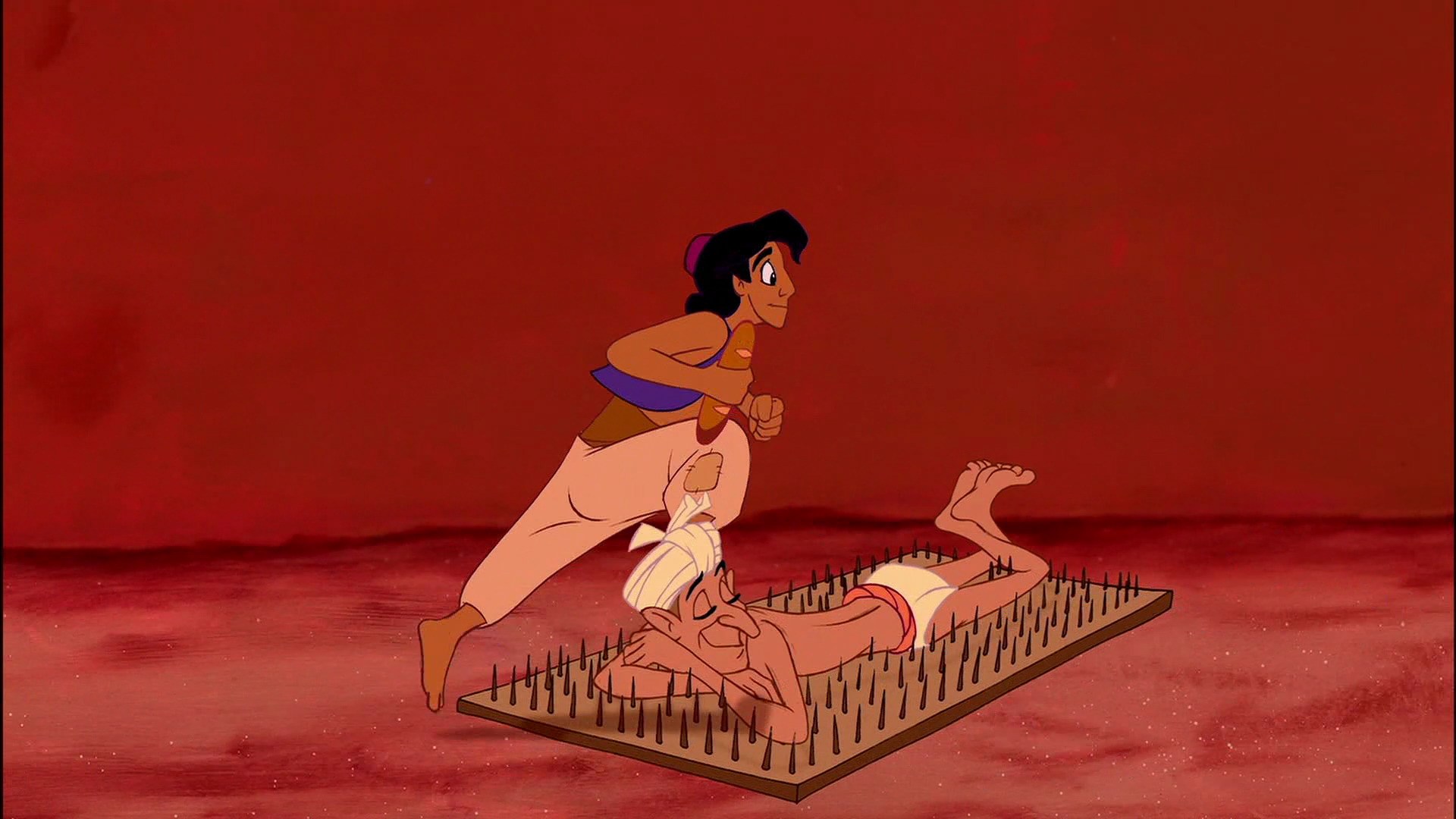
Gotta keep
One jump ahead of the breadline
One swing ahead of the sword
I steal only what I can't afford
(That's everything)
0:07:22 – “One Jump Ahead” is the only real miss of the songs in this film. There is nothing embarrassing about it, but it has more to do with the fact that every other song is an absolute homerun. It establishes Aladdin’s motivations, but is very forgettable.
Aladdin races through Agrabah away from the guards meeting every Arabic cliché along the way (needle sleeping, hot coals, sword swallowing, snake charming). The cultural issues in this film are massive. There is no appreciation for the region, just a regurgitating of secondhand fairy tales. Since this essentially is a fairy tale, we can give it a pass…but it certainly hasn’t aged well.
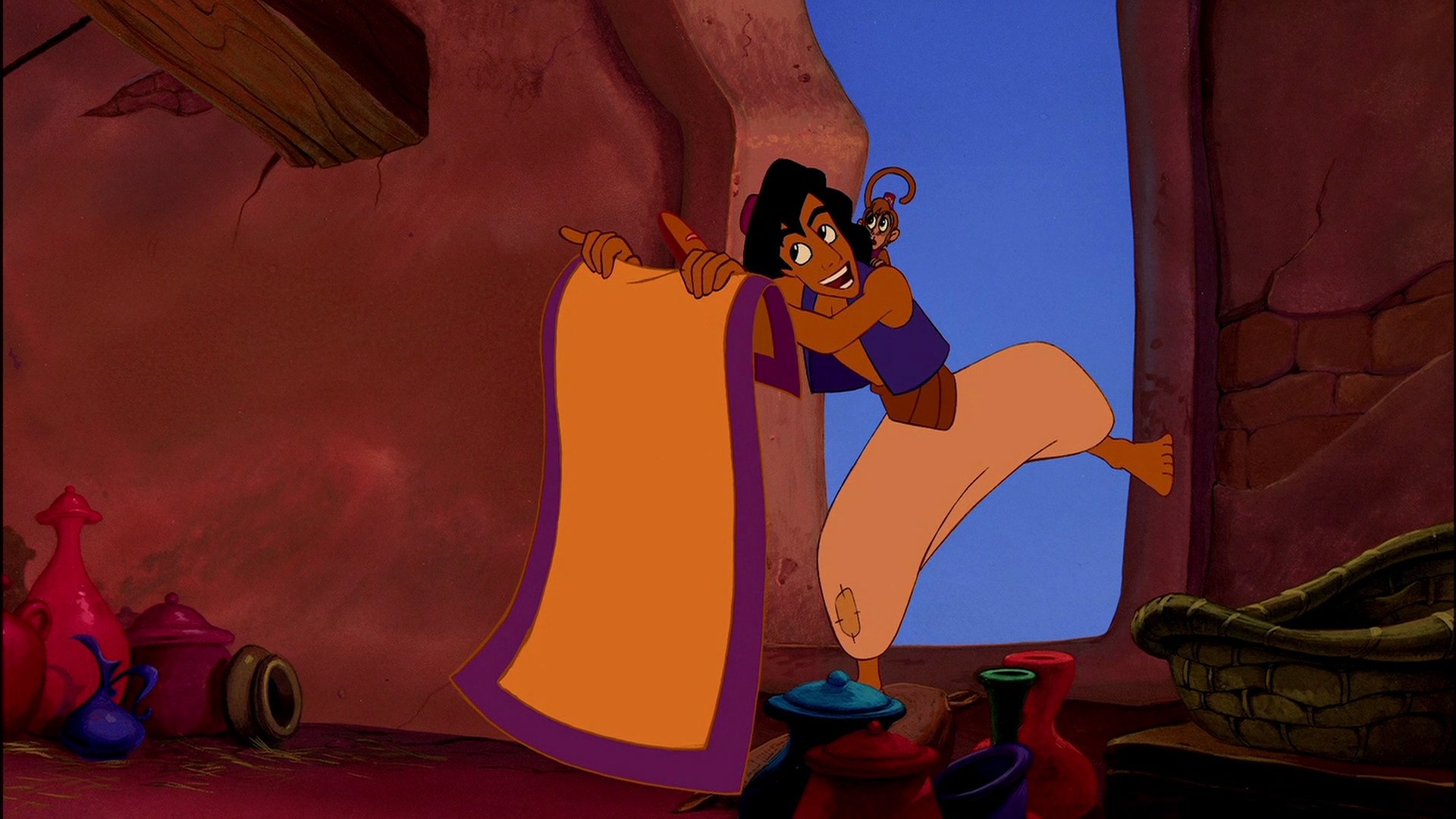
0:09:15 – Aladdin and Abu escape on a “flying carpet” which is a nice foreshadowing to an upcoming chapter in the film.
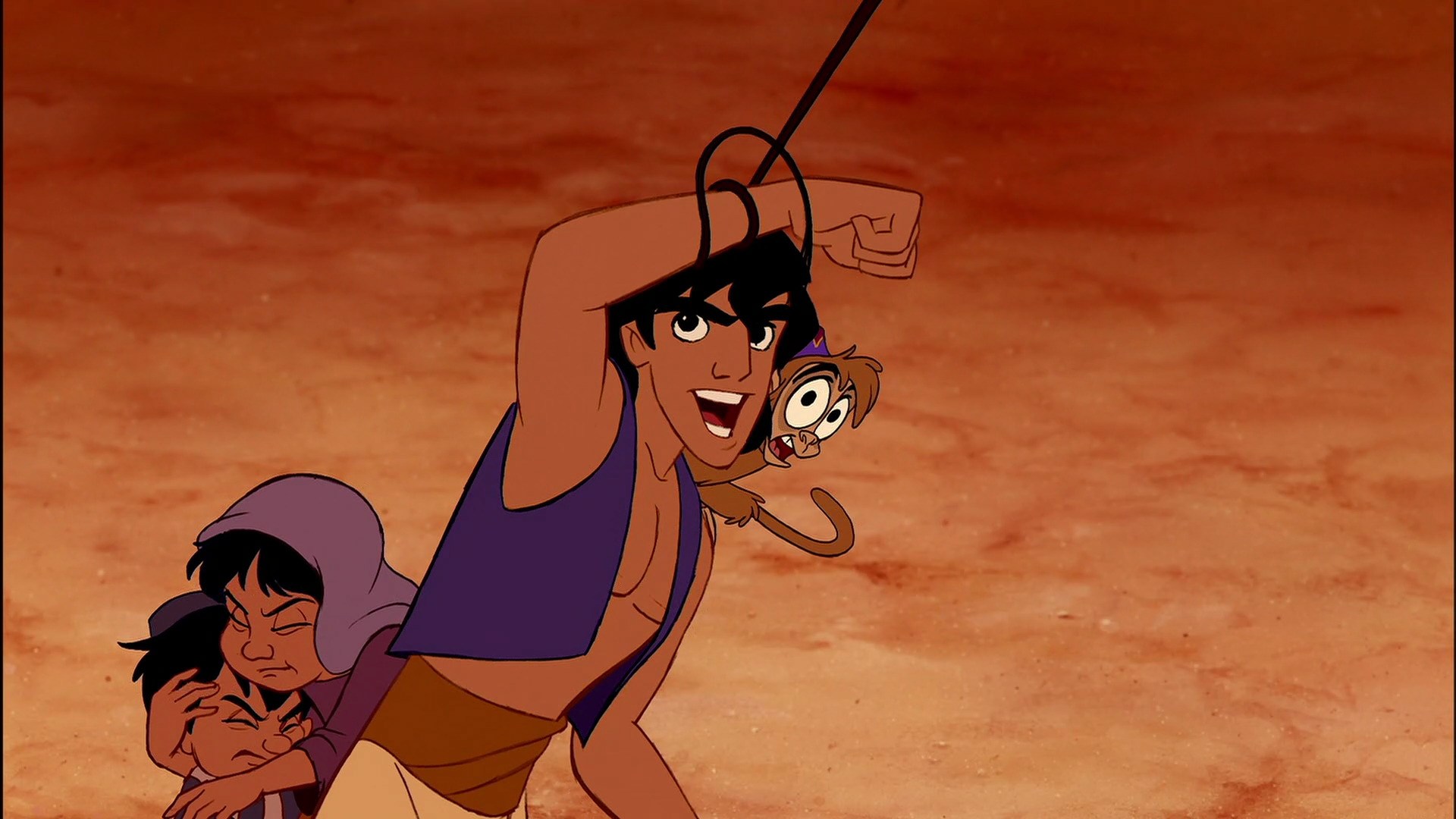
0:09:38 – About to enjoy their spoils, Aladdin notices two hungry kids rooting around for food. He selflessly gives the bread to the kids and convinces Abu to do the same. Noticing a parade, the kids are almost whipped by a potential suiter for the princess, but Aladdin swoops in to save the day. In around three-and-a-half minutes, we know everything we need to know about Aladdin and we are fully invested in his success. Economic storytelling at its finest.
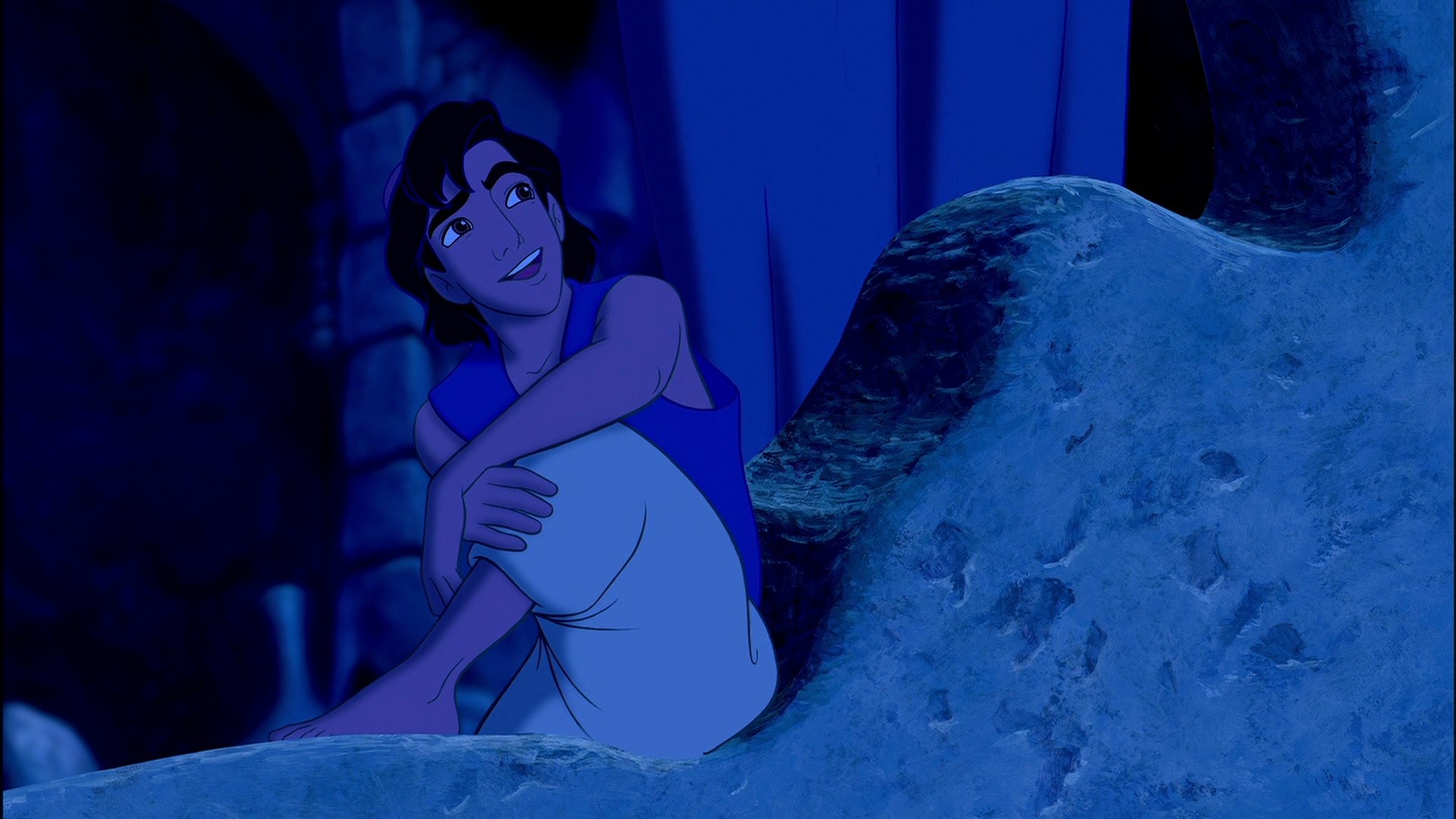
Riff-raff, street rat. I don't buy that.If only they'd look closer.Would they see a poor boy?No siree.They'd find out there's so much more to me.
0:11:25 – “One Jump Ahead” gets a somber reprieve and we get our hero-expresses-their-hopes-and-dreams moment.
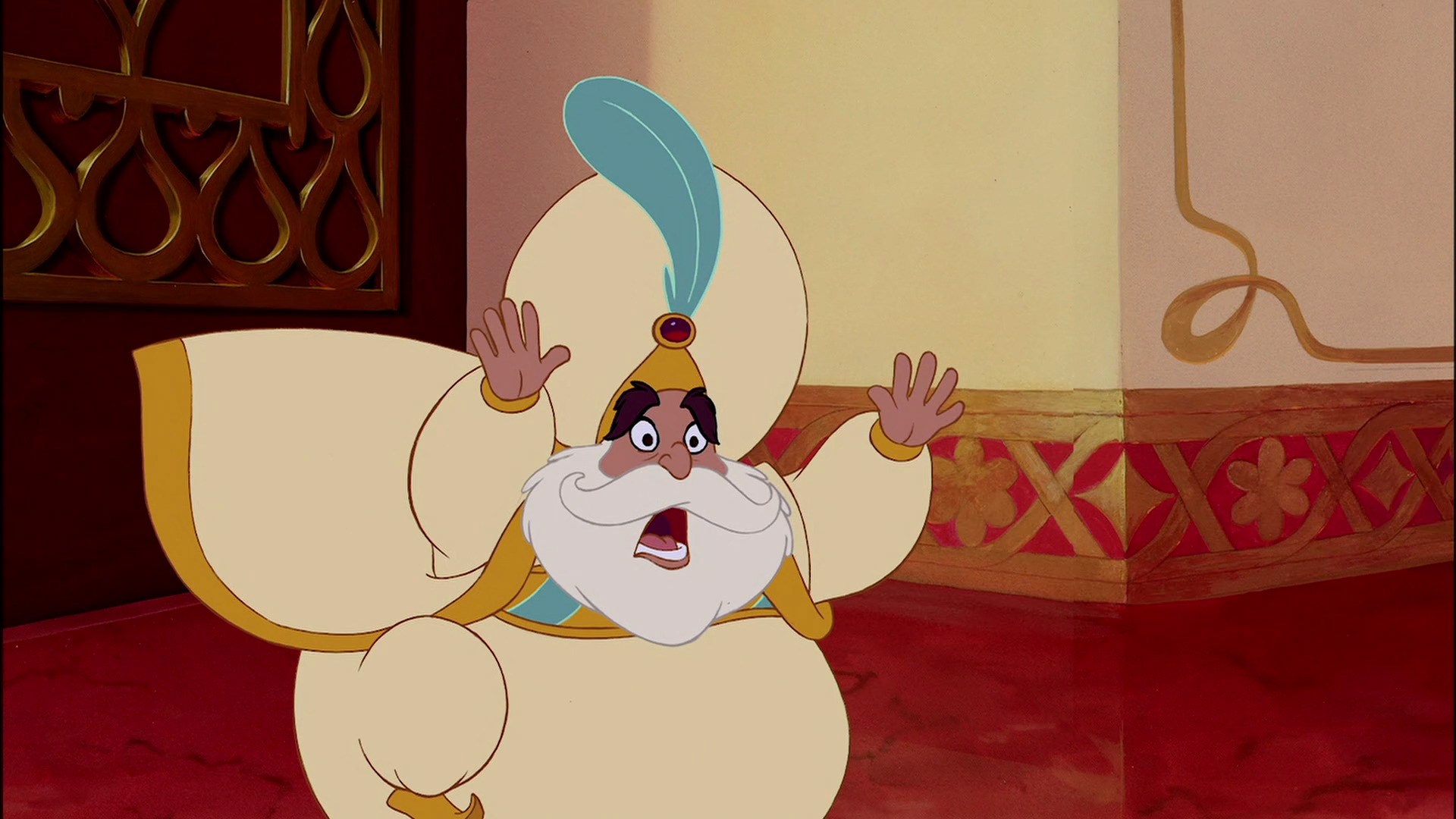
0:12:15 – Aladdin introduces so many main characters in such a short span, that it’s almost hard to keep up. We see the princess’ suitor with a chunk of his pants missing and we are introduced to one of my personal favorites, the Sultan. He seems like more of a buffoon than a leader, but he exudes parental warmth and love. Patrick Stewart turned down the role, but I can’t imagine anyone doing better than Douglas Seale. We also get an introduction to Jasmine’s best friend, the tiger Raja.
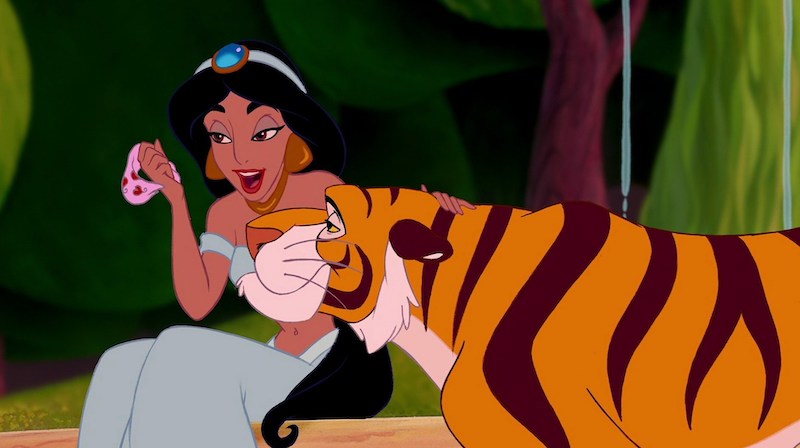
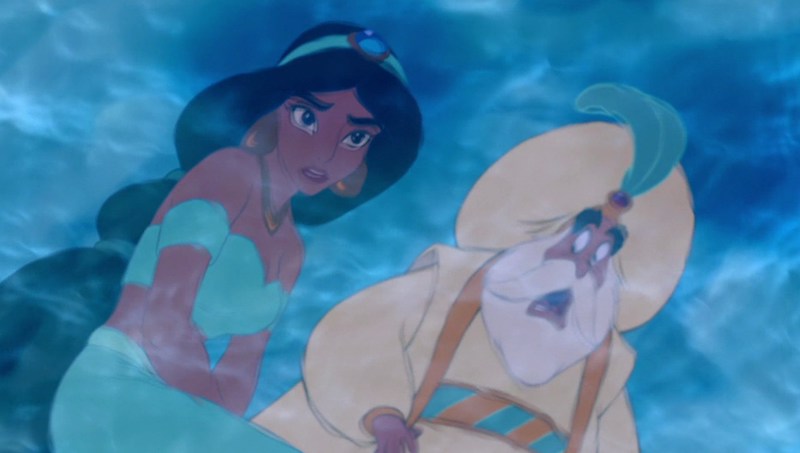
0:12:40 – Ahh…Jasmine. Meeting Jasmine was the moment I knew I was straight. While Ariel and Belle had innocence about them, Jasmine had an edge that we had yet to see out of a Disney princess. Just as we had with the introduction for Aladdin, Jasmine’s characterization is completed in less than two minutes. She is sweet, a good judge of character, wants to live her own life, and cares more about love than tradition.
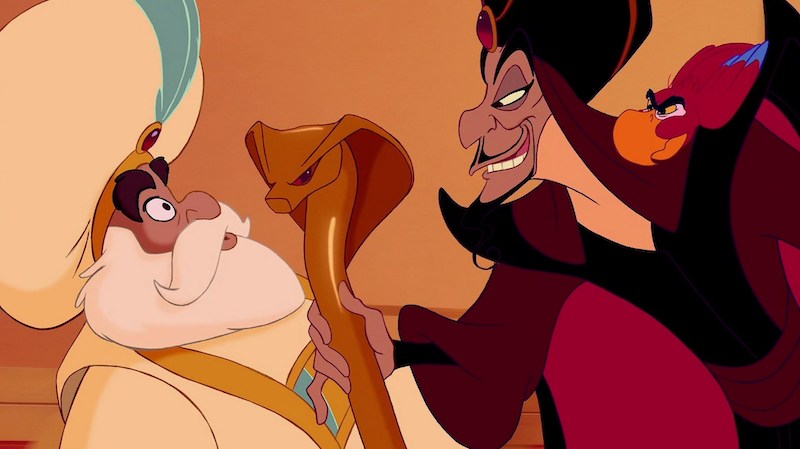
0:14:21 – Jafar is shown as being in the Sultan’s inner circle. He needs the Sultan’s blue diamond for nefarious means and brainwashes the Sultan to get it using his cobra staff.
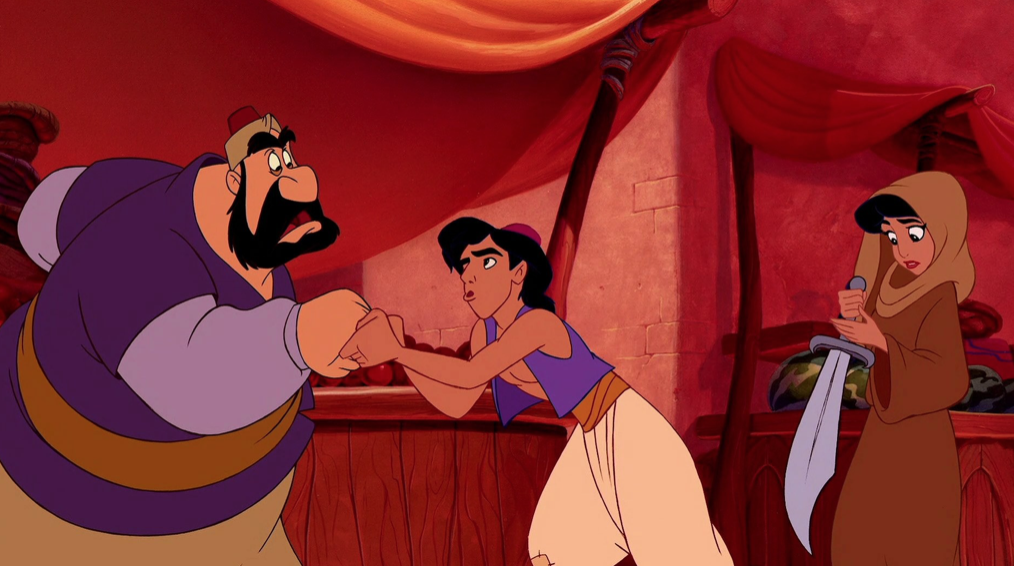
0:16:10 – Jasmine has to live her own life and ventures outside the palace walls with a whimpering Raja left behind. She ventures into the open-air market with curiosity and wonder. She even feeds a hungry child and almost loses a hand, but is saved by Aladdin with some light improv.
0:19:23 – Iago and Jafar are working through some magic to show the diamond in the rough, which is revealed to be Aladdin, who brings Jasmine back to his place and tries to make a move. Sharing their feelings of being “stuck,” they almost share a kiss but are interrupted by the guards who Jafar has sent.
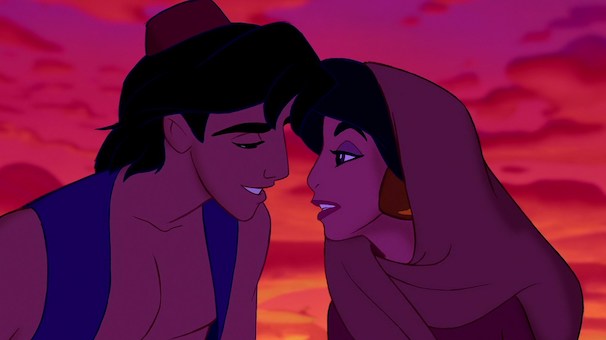
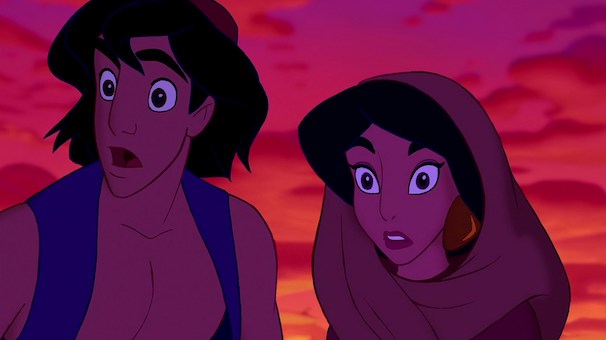
0:22:40 – “Do you trust me?” becomes one of the resounding themes of the film as Aladdin and Jasmine attempt a jump from the rooftops to escape. Aladdin is caught, but Jasmine reveals herself to secure his release, unfortunately it doesn’t work and Aladdin is taken away.
0:23:35 – Jafar emerges from his lair and is met by a fuming Jasmine. He lies and says Aladdin has been beheaded, while Jasmine runs away upset.
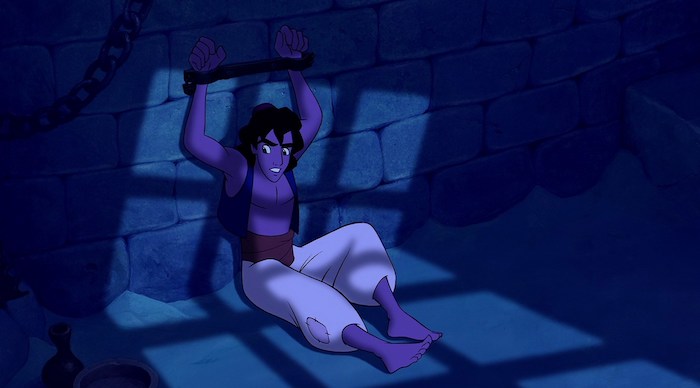
0:25:16 - Aladdin is actually stuck in the dungeon, but Abu is there to help pick his lock. A fellow decrepit prisoner is revealed to be Jafar and allows Aladdin to escape and enter the Cave of Wonders
0:27:30 – Our hero arrives at the cave and is allowed to enter and told to touch nothing but the lamp...
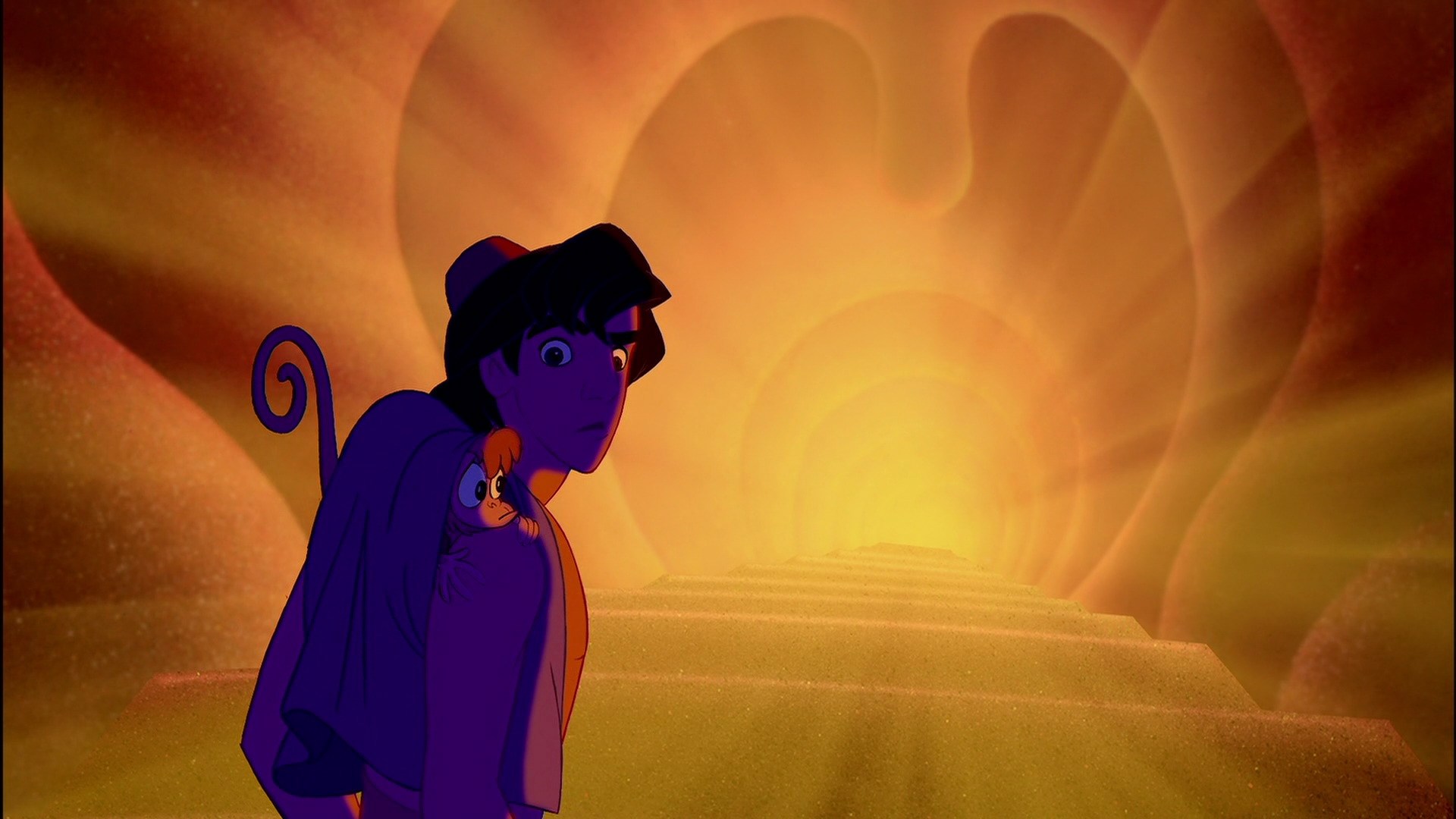
That’s it for Part 1. Join Timothy Brayton for Part 2 as we meet the Genie and 'Prince Ali Ababwa'



Reader Comments (9)
Abu is a strong example of a non-verbal sidekick, but I think the animators outdid themselves with the magic carpet's communication. It's such terrific character work using just animation and score.
Oh wow thanks for doing this! I LIVED for the 90s Disney animated films as a kid and this really takes me back. You guys should totally do it for some of the other Renaissance films as well (Mermaid, Beauty and the Beast etc).
Wow, I love this. Thanks for doing this.
“One Jump Ahead” is the only real miss of the songs in this film.
I feel the opposite way. "One Jump Ahead" stood out to me when I saw Aladdin in the theater precisely because it was not a standard showtune. Setting aside the chorus, it's a proactive and masculine song about a guy who doesn't have the time to stand and sing.
It doesn't surprise me that other songs in the movie get the radio airplay and the Oscar nominations. No one on American Idol is going to choose it on Disney night. "One Jump Ahead" is confined to its singular purpose in the film, where it simply works.
Brevity -- I agree and disagree. I think the best musical theater songs also work out of context (though its true that in context is most important since they're storytelling devices). Strangely I do think "One Jump Ahead" is relatively weak but "One Jump Ahead (Reprise)" is actually my favorite song in the movie.;)
Jase -- well, we'll have to see the response to this one first.
Cash -- i haven't seen this in so many years (i have part three) so I will be looking forward to the magic carpet now based on this comment.
Is this the Aladdin song with the hidden ‘all good teenagers take off their clothes’ lyric?
The designs for a lot of the characters were inspired by Hirschfeld and clear geometric shapes, which is such an effective choice. The characters all so distinctive and looking at them, you immediately know what kind of character they are and what kind of movie this will be. Now that's economic visual storytelling.
I got some things backwards...
Patrick Stewart turned down the role of Jafar due to scheduling conflicts, not the Sultan
Ben: I mean, that (kind of) makes a bit more sense, but not by much. Even if he WAS free, this absolutely wasn't the time (mid-TNG? You kidding?) for Stewart to subvert himself. That time would come 25 years later.